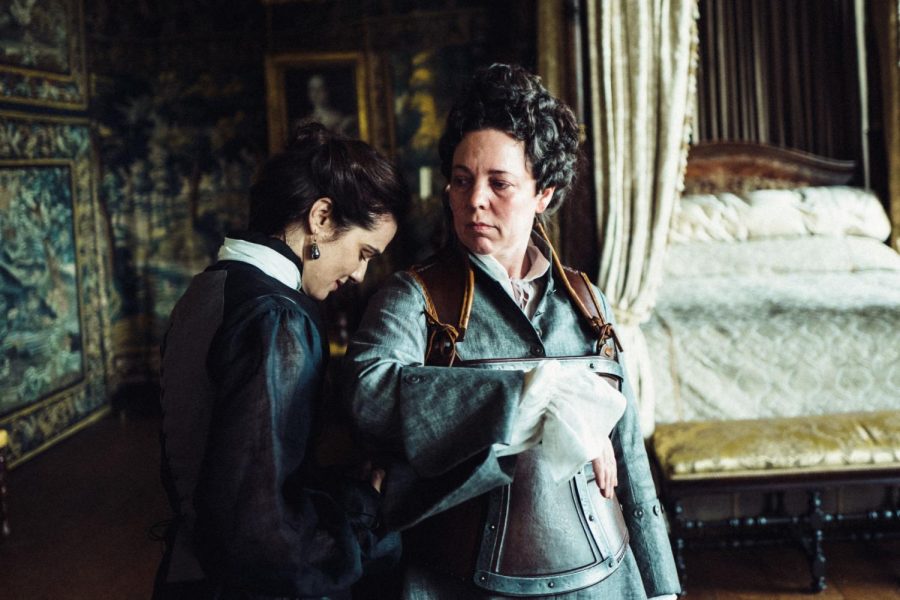“The Favourite” Offers Poignant Commentary on Society, and Love
Rachel Weisz and Olivia Colman in the film THE FAVOURITE. Photo by Yorgos Lanthimos. © 2018 Twentieth Century Fox Film Corporation All Rights Reserved
February 19, 2019
Yorgos Lanthimos is not known for making prestige movies. The eclectic director of The Lobster and The Killing of a Sacred Deer is one of the fast-rising stars behind the camera in Hollywood, but the Greek director isn’t usually recognized for making movies that appeal to all audiences.
Thus, when his 2018 film The Favourite nabbed 10 total nominations ahead of the approaching Academy Awards, I was personally shocked, never expecting Lanthimos’ film to be as accessible on such a level. However, The Favourite is not only relatable for every audience member but forces each viewer to confront his or her inner demons, producing an incredibly poignant commentary.
Lanthimos’ latest work sets 18th-century England as the background and uses a feud between two cousins over the affection and power of Queen Anne as the main plot thread. While Lanthimos’ signature abnormalities are not absent from the film, including out-of-context quacks from ducks and quick-witted humor and writing characteristic of a Seth Rogan film rather than a serious period piece, Lanthimos still somehow manages to craft a deeply profound and tragic commentary on the way we see love in our world.
Queen Anne is the proud owner of 17 individual rabbits, one for each child that she lost, some before they were born, some after. Thus, these rabbits represent the death of the queen’s love, a love that is gone just as her children are. The rabbits are the only remaining reminders of her children, reminders of wounds of Queen Anne that, as she describes, “do not close.” It is only through her beloved Lady Sarah, the woman at her side through everything, that she can find any form of love.
However, love is not something that can simply be replaced or represented in one’s life. As Queen Anne’s stability begins to falter and she enters a destructive and dangerous spiral, Lanthimos begins to craft this poignant statement on love, demonstrating the significance of true love, being one that is honest and truthful rather than one that is merely a fabricated emulation.
Thus, as Lanthimos finishes connecting the points in the 18th-century love triangle and draws his final conclusions from his examination of love, the boundaries between true love and its fabricated form are drawn clearly and boldly. As Queen Anne is forced to reckon with the decisions she has made and examine herself whether she has accepted true love in her life, Lanthimos closes with images of the rabbits filling the screen, forcing audience members to confront their own experiences and whether they truly know and hold true love within their own lives.
In the midst of her battle with Abigail for the heart of the queen, Lady Sarah poses true love as being that which is truthful, love without lies. While Lanthimos brilliantly demonstrates the rabbits to show Queen Anne’s inability to truly confront her own demons and accept this type of love, it is his closing shot of the rabbits that is the most powerful in the entirety of the film. The audience is paralyzed, nowhere to go; it is up to each member to examine whether or not they are being truthful in the love that they give and receive, or whether their relationships with others are merely empty vehicles being used to hide the devastating truth about their own lives that they cannot bear to face quite yet.
Therefore, Lanthimos confronts the audience with the most difficult task of all: being honest with themselves. Is their love true and full of honesty, or is it merely a fabrication to obscure a truth they are too afraid to face? The closing shot serves as the director’s indictment against society and the way we hide from confronting our individual forms of love, The Favourite becomes more than merely a story about a love triangle. Rather, it is a challenge to all of society, asking us to accept the harsh realities of the world and be honest with our love unless we wish to forever be as empty as the wounds Queen Anne will never be able to fill.











